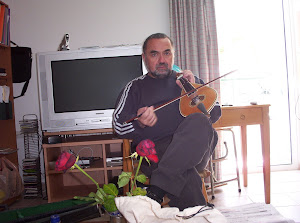Dariush
Mehrjui-The postman (1970)
Η ταινία αυτή του Mehrjui είναι εμπνευσμένη από
το θεατρικό έργο του Γκέοργκ Μπύχνερ «Βόιτσεκ».
Δεν είναι ο μόνος
που εμπνεύστηκε από αυτό το έργο. Ο Βέρνερ Χέρτζογκ και ο Janos Szasz έχουν γυρίσει ομώνυμες
ταινίες, για τις οποίες γράψαμε
πριν τρία χρόνια. Ο Mehrjui,
που και αυτός εμπνέεται από θεατρικά έργα, προτιμά τον τίτλο «Ταχυδρόμος» για
το έργο του, παρόλο που ακολουθεί αρκετά πιστά το θεατρικό πρότυπο. Στη «Σάρα»
όμως παραπέμπει, αν και αρκετά αόριστα, στη «Νόρα» του Ίψεν, με τη δεύτερη
συλλαβή να είναι η ίδια και στα δυο ονόματα (πριν τρία χρόνια που έκανα
εγχείρηση καταρράκτη και για ένα μήνα δεν μπορούσα να διαβάσω, έβλεπα ταινίες,
ταινίες ιρανικές, των κορυφαίων ιρανών σκηνοθετών που είχα στο αρχείο μου. Δεν
έκανα ξεχωριστή ανάρτηση για κάθε μια, απλά έγραφα δυο λόγια σε ένα ενιαίο
κείμενο). Παρεμπιπτόντως στο έργο υπάρχει μια σκηνή που παραπέμπει άμεσα στον «Ερρίκο
τον τέταρτο» του Πιραντέλο, του οποίου είχα δει την κινηματογραφική μεταφορά,
πριν χρόνια, με τον Μαρτσέλο Μαστρογιάννη στον κεντρικό ρόλο.
Ό, τι ήσαν τα έπη
για τους αρχαίους τραγικούς είναι σήμερα τα θεατρικά έργα και τα μυθιστορήματα
για τους σκηνοθέτες, με τα δεύτερα να εμπνέουν επίσης θεατρικούς σκηνοθέτες.
Αλλά για τον «Καπετάν Χουρσίτ» θα γράψουμε αμέσως μετά. Ποιος είναι ο
σκηνοθέτης και από ποιο έργο εμπνέεται; Δεν έχετε παρά να διαβάσετε την
ανάρτηση που θα κάνω.
Ο Mehrjui ακολουθεί
αρκετά το πρότυπό του, όμως όχι εξολοκλήρου. Η γυναίκα του Ταγ, του ταχυδρόμου,
δεν αναζητεί ξένες αγκαλιές, ούτε έχει εξώγαμο παιδί όπως στο έργο του Μπύχνερ.
Απελπισμένη από την σεξουαλική αδιαφορία του άντρα της ενδίδει στην πίεση του
ανιψιού του αφεντικού τους.
Ενώ το έργο του
Μπύχνερ με τον φουκαρά, ελαφρά καθυστερημένο ήρωά του είναι μια τραγωδία, το
έργο του Mehrjui είναι μια tragicomedie,
στο οποίο τα κωμικά στοιχεία τονίζουν τον τραγικό χαρακτήρα του ήρωα. Κωμικά
παρουσιάζει ο Mehrjui και τα δυο άλλα κύρια πρόσωπα του έργου, τον θείο και τον
γιατρό.
Επειδή το έργο του
Μπύχνερ αποτελεί ένα από τα αριστουργήματα της παγκόσμιας δραματουργίας
θεωρήσαμε σκόπιμο να παραθέσουμε και κάποια κείμενα για αυτό το έργο του Mehrjui που
βρήκαμε στο διαδίκτυο.
After finishing Agha-ye
Hallou in 1970, Mehrjui traveled to Berkeley,
California and
began writing an adaptation of Georg Büchner's Woyzeck for a modern day Iranian setting. He went back
to Iran later in 1970 to shoot Postchi (The Postman), which
starred Nassirian, Entezami and Jaleh Sam.
In the film, Nassirian plays Taghi, a miserable civil servant whose life
spirals into chaos. He spends his days as an unhappy mail carrier and has two
night jobs in order to pay his debts. His misery has caused impotence and he is
experimented upon by an amateur herbalist who is one of his employers. His only
naive hope is that he will win the national lottery. When he discovers that his
wife is the mistress of his town's wealthiest landowner, Taghi escapes to the
local forest where he experiences a brief moment of peace and harmony. His wife
comes looking for him, and in a fit of rage Taghi murders her and is eventually
caught for his crime.[2]
Postchi faced the same censorship issues as Gaav,
but was eventually released in 1972. It was screened in Iran at the 1st Tehran
International Film Festival and at the Sepas Film festival. Internationally it
was screened at the Venice
Film Festival,
where it received a special mention, the 22nd Berlin International Film Festival, where it received the Interfilm
Award, and the 1972 Cannes Film Festival, where it was screened as part of the Directors'
Fortnight.[2]
This film firnly establishes as a major talent the Iranian
Mehrjui, whose successful fusing of pathos, humor, and pre-
occupation with the poor resembles nothing less than Chaplin
or early De Sica in its ferocity. In his earlier The Cow, the
only owner of such a precious animal in a poverty-stricken
village goes insane over its loss and assumes its place;
berserk, he is put into a harness, is dragged off to a
nearby hospital, beaten like an animal, and finally
dies the death of a beast in a mudhole. The Mailman
is an unforgettable Wozzeck-like figure, the eternal
simple-minded victim who finally rises to mistaken
grandeur in a murderous gesture that leaves him
braying with despair over the body of his victim.
Since such films can never be popular, they are living
proof of the fact that box-office returns must not
be allowed to determine the life of a work of art.
Mehrjui, whose successful fusing of pathos, humor, and pre-
occupation with the poor resembles nothing less than Chaplin
or early De Sica in its ferocity. In his earlier The Cow, the
only owner of such a precious animal in a poverty-stricken
village goes insane over its loss and assumes its place;
berserk, he is put into a harness, is dragged off to a
nearby hospital, beaten like an animal, and finally
dies the death of a beast in a mudhole. The Mailman
is an unforgettable Wozzeck-like figure, the eternal
simple-minded victim who finally rises to mistaken
grandeur in a murderous gesture that leaves him
braying with despair over the body of his victim.
Since such films can never be popular, they are living
proof of the fact that box-office returns must not
be allowed to determine the life of a work of art.
Taghi, a postman, lives with his beautiful young wife on his master’s
land. He is sexually weak. His doctor is a vet who treats him with herbal
medicines. The master’s nephew is a young engineer who aims to establish a pig
breeding farm on his uncle’s land. The young engineer sleeps with Taghi’s wife.
Taghi’s ego is hurt because of humiliation and hard work. When he finds out
about the engineer’s relationship with his wife, he kills his wife and goes
crazy. They take him to a mental institution. Mehrjui’s fourth film, The
Postman, is a political satire based on Georg Buchner’s play, Woyzeck. As
Mehrjui said in 1979: “After the screening of The Postman, many viewers and
critics accused me of suspicion. This group stated that Mehrjui’s film
characters are always weak in the society. They especially wanted to know the
reason for Taghi’s fight with the master with an empty gun in hand. But they
had forgotten the point that I only discuss the problems as a director, and
finding the answers is among the viewers duties…








No comments:
Post a Comment